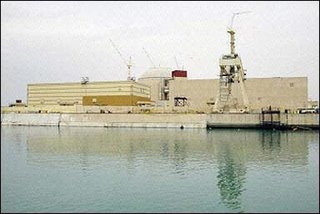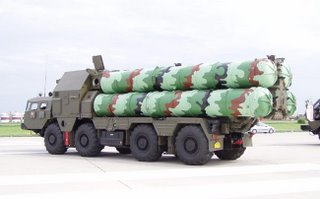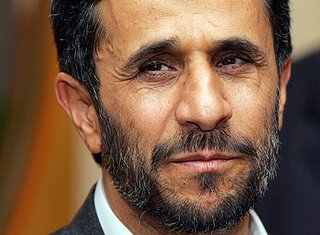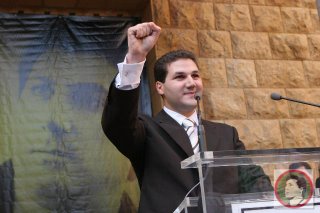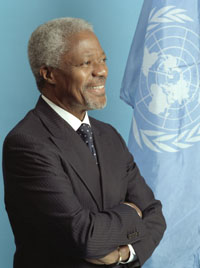
SPIEGEL ONLINE - September 24, 2006, 12:01 PM
Syrian President Bashar Assad: "Those who ask this US government about its vision don't receive answers anymore."
URL: http://www.spiegel.de/international/spiegel/0,1518,438804,00.html
SPIEGEL Interview with Syrian President Bashar Assad
"America Must Listen"
The Middle East, says Syrian President Bashar Assad, 40, seems to be teetering on the brink of chaos. He spoke with SPIEGEL about his country's difficult relationship with the United States, the pressure to go to war, and the consequences of the wars in Lebanon and Iraq.
SPIEGEL: Mr. President, the foiled attack on the US embassy in Damascus killed six people and has once again focused the world's attention on Syria's complicated relationship with the United States. What do you know about the background of the attack?
Assad: It was a terrorist attack -- which, on the face of it, says very little. Terrorism today is a state of mind that on the one hand has to do with ignorance and, on the other hand, can be attributed to a feeling of desperation over the political situation, which at some point takes the form of revenge. This appears to have been the background of this attack: a reaction to America's policies in Iraq, Palestine and Afghanistan.
SPIEGEL: One of the attackers was still alive for a short time after the attack. Did your intelligence services manage to interrogate him?
Assad: No, he was in a coma before he died. Our conclusions are based on data that was in the attackers' computers and on information from their private sphere. They were essentially from the same intellectual mould: men who call Osama bin Laden the "Lion of Islam." Al-Qaida people -- not in a hierarchical sense, but in terms of their worldview. Isolated young men from the Damascus suburbs -- which is what makes the whole thing so dangerous. We can fight a terrorist group, but these isolated cells suggest that such ideas are widespread.
SPIEGEL: United States Secretary of State Condoleezza Rice thanked Syria for its role in preventing the attack. In return, however, you sharply criticized America's Middle East policies. Why didn't you take advantage of this rare gesture of goodwill?
Assad: Ms. Rice didn't thank us for our policies, only for our response to the attack. But this attack happened precisely because of American policies in our region.
SPIEGEL: Why should the Americans be at fault?
Assad: Because they contribute to hopelessness in our country, and to silencing the dialogue between cultures. And then there is the condescending language -- the expression "islamofascism," which President Bush used, is a prime example. The pope's recent comments are also part of it. Such statements complicate the situation and create this need for revenge.
SPIEGEL: A need for revenge could be understandable in Iraq or Palestine -- but in Syria?
Assad: There are close ties among our peoples, whether in Iraq, Syria or Palestine. We have the same feelings, the same habits and the same pride. Look at Damascus. There are 500,000 refugees from the occupied Golan Heights, about 500,000 from Palestine and about 100,000 from Iraq living here. We tend to the needs of these people, but all we get from the West is rejection.
SPIEGEL: What has to happen for Syria and the United States to reconcile?
Assad: America must listen. It must listen to the interests of others. But the US government has no interest in similarities, no matter how obvious. Think of the war against terrorism. In my view, Washington's approach can be compared to a doctor constantly banging away at a tumor instead of removing it surgically. Terrorism is growing instead of declining. We both suffer from it, but the United States doesn't want to cooperate with us.
SPIEGEL: The situation was different for a brief time after Sept. 11, 2001.
Assad: Yes, after the attacks I wrote a letter to President Bush and offered greater cooperation on security matters. It worked for quite a while and together, as the then CIA Director George Tenet confirmed to the US Congress, we saved many American lives. Then the Iraq war began to take shape and America started making many mistakes. And our cooperation ended.
SPIEGEL: After the most recent attack, too, there has been contact between US diplomats and Syrian officials.
Assad: Yes, but whether these meetings amount to anything will depend on the will of the Americans. What kinds of issues should we be discussing? Do we want to sit there drinking coffee and talk about the weather? Or do we want to achieve something in Iraq, in Lebanon and in the Middle East peace process? Those who ask this US government about its vision don't receive answers anymore.
SPIEGEL: There was a vision: democracy in Iraq -- a model for the region.
Assad: And where is this democracy today? Simply naming objectives isn't sufficient for a vision. If I say that I'm going to build a large palace, but I don't have any money to do so, then that is not a vision -- it's an illusion.
SPIEGEL: You are very pessimistic when it comes to Iraq. What can the countries of the Middle East do for Iraq?
Assad: I was already very pessimistic before the war. I told the Americans: There is no doubt that you will win this war, but then you will sink into a quagmire. What has now happened is worse than I expected. The two main problems are, first, the constitution and the issue of federalism, which is at the center of the great dispute between Sunnis and Shiites and, second, Kirkuk and the civil war that is developing between Kurds and Arabs. These problems must be addressed. It doesn't help for the Americans to point to the elections they brought about or to the higher standard of living. Those are cosmetic issues.
SPIEGEL: What would be the consequences of partition into a Kurdish north, a Shiite south and a Sunni region in central Iraq?
Assad: It would be harmful, not just for Iraq, but for the entire region, from Syria across the Gulf and into Central Asia. Imagine snapping a necklace and all the pearls fall to the ground. Almost all countries have natural dividing lines, and when ethnic and religious partition occurs in one country, it'll soon happen elsewhere. It would be like the end of the Soviet Union -- only far worse. Major wars, minor wars, no one will be capable of keeping the consequences under control.
SPIEGEL: So you would be in favor of a strong man who could hold Iraq together?
Assad: Not necessarily one man, but certainly a strong central authority. It has to be left to the Iraqis to determine exactly what this would look like. A secular authority is certainly best-equipped for maintaining stability in this ethnic and religious mosaic -- but it should also be of a strong national character. Those who arrived on America's tanks are not credible in Iraq.
SPIEGEL: After the cease-fire between Israel and the Hezbollah militia, you gave a much-noted speech on the situation in the Middle East. In your speech, you mentioned a "critical stage of the history of Syria and the region." Wherein lies the opportunity?
Assad: First of all, it's clear to everyone that the status quo of war and conflict and instability is no longer acceptable. Now America enters the picture, because only America, because of its weight, can be the main broker for peace in the Middle East. But the Bush administration is under pressure. It's being accused of not having managed to bring about peace in six years. This pressure is good. Europe's foreign policy role is also growing. We specifically do not want a special role for the Europeans. We expect them to work together with America to achieve peace, and to do so on the basis of a vision America must develop.
SPIEGEL: What is Syria's role?
Assad: There can be no peace in the Middle East without Syria. The Lebanon and the Palestinian conflicts are inextricably linked with Syria. I have already mentioned the 500,000 Palestinian refugees. Were we to resolve our territorial dispute with Israel over the Golan Heights alone, we wouldn't achieve stability. We would only be taking away the Palestinians' hope and would be turning them from refugees into resistance fighters. This is why Syria is so determined to achieve a comprehensive peaceful solution.
SPIEGEL: What exactly will happen to the Palestinian refugees? To where should they return?
Assad: They have the right of return, at least to Palestine...
SPIEGEL: ... to Palestine or Israel?
Assad: You would have to talk to the Palestinians about that. What we are talking about now is their return to the Palestinian state -- which is something George W. Bush also speaks about. But it raises questions. What sort of state is this at all? A sovereign state or just a few specks of land covering a few square kilometers? Incidentally, I do not believe that the majority of the refugees want to return to Israel. Most of them want to go back to a Palestine within the borders of 1967. The problem is that at the moment Israel is even rejecting this return. This is unacceptable to us.
SPIEGEL: In your speech, your tone was quite a bit different. In it, you called Israel an "enemy" and praised the "glorious battles" of Hezbollah. German Foreign Minister Frank-Walter Steinmeier cancelled his trip to Damascus as a result.
Assad: Whenever you Germans come to Syria, you talk about freedom of opinion. Why don't you allow me to have my opinion? But seriously: politicians should listen carefully. In my speech, I used the word "peace" 57 times. And if this speech was bellicose, how should one interpret the fact that Germany sends a submarine to the Israelis every other year?
SPIEGEL: Were you disappointed when Steinmeier cancelled his trip?
Assad: Of course, but the German foreign minister remains in contact with our foreign minister and has said that he wants to make up the trip. There's another thing: The majority of my people think the way I spoke. We all have to have consideration for public opinion in our countries: the Europeans for theirs, and I for public opinion in Syria.
SPIEGEL: Public opinion in Germany would not have accepted it had the foreign minister not reacted to your having called Israel an enemy.
Assad: But Israel occupies a part of my country - of course Israel is an enemy. If you want to play a role in our region, then you have to be able to see things from our point of view. That's also true for the classification of Hezbollah as a "terrorist organization." That cannot remain so. In 2004, Germany played an important role during the prisoner exchange between Israel and Hezbollah. That's exactly the point: to work within the realities that exist in this part of the world.
SPIEGEL: Germany's history also plays a role. Do you accept that Germany has a special responsibility for Israel?
Assad: Do you mean that Israel is allowed to kill Palestinians and Arabs because Jews at that time were killed in Germany?
SPIEGEL: No, of course not. We're talking about Israel's right to exist.
Assad: But why don't you also protect our right to exist? For us, the balance is important, and there, Europe is much closer to us than America. Europe knows our world.
SPIEGEL: Not long from now, German ships will begin patrolling off the Lebanese coast. What do you think of the German military mission in the Middle East?
Assad: That depends on the mission. Germany is supposed to prevent weapons from reaching Hezbollah. History teaches us that nobody can prevent a resistance group from arming when it has the support of the people.
SPIEGEL: Mission Impossible for the German navy?
Assad: As long as the public support for Hezbollah remains as high as it is today, yes, it is a Mission Impossible. The majority here sees the resistance against Israel as legitimate. I would advise the Europeans: Don't waste your time, address the roots of the problem.
SPIEGEL: How does Syria support Hezbollah? With weapons?
Assad: As a resistance organization, Hezbollah has a right to arm itself - and they have more than enough weapons. In Syria, we wouldn't make ourselves the target of an Israeli attack by delivering arms. We support Hezbollah by helping with the reconstruction of Lebanon or by opening up our universities to its students.
SPIEGEL: At the moment, Syria enjoys excellent relations with Iran. Do you agree with President Mahmoud Ahmadinejad's demand that Israel be "wiped off the map?"
Assad: The statement is so famous because nobody believes any more in Israel's peaceful intentions. An entire generation is growing up today with the conviction that only strength and war will lead to peace.
SPIEGEL: Do you believe that too?
Assad: I don't believe in war, I believe in the principle of deterrence.
SPIEGEL: That's not, though, what Ahmadinejad means.
Assad: I don't say that Israel should be wiped off the map. We want to make peace - peace with Israel.
SPIEGEL: So you have a different point of view than Ahmadinejad?
Assad: To be honest, I've never discussed this point with him personally. But even my personal opinion, my hope for peace, could change one day. And when the hope disappears, then maybe war really is the only solution.
SPIEGEL: Israel is strong - but weakened by the war in Lebanon. America is strong - but weakened by Iraq. Syria and Hezbollah have been strengthened by the recent conflict. According to your logic, isn't now the moment for peace?
Assad: Many people asked me during the war: "Why are you always talking about peace? Why don't we go to war? Let's go the way of the resistance - Hezbollah is finding success with it." That's the mood here. One should know that in the West.
SPIEGEL: Under your father, Syria and Israel came very close to a peace treaty. Will you one day sit down at the same table with Israel's Prime Minister Ehud Olmert?
Assad: Diplomats would likely have to sit down together for a long time - like 10 years ago when we negotiated with Israel under the mediation of President Bill Clinton. But if peace comes, then everything will change. Peace has a lot of strength. Whether I will ever sit down with Olmert, whether I ever shake his hand, I'll decide that when the time comes.
SPIEGEL: During our last discussion a year ago, you denied that Syrians had anything to do with the murder of former Lebanese Prime Minister Rafik Hariri.
Assad: And I'm even more convinced of that today than I was then. It was unfortunately a German, UN investigator Detlev Mehlis, who accused us of being behind the attack. But he never presented concrete evidence.
SPIEGEL: Mehlis's successor Serge Brammertz will soon present his interim report.
Assad: We are not concerned. What can one accuse us of? The only thing we know is that it was a suicide attack, similar to the attack on the US Embassy in Damascus. We don't know if there was someone big behind this crime.
SPIEGEL: Six years ago, you took office as a reformer. Are you disappointed that you haven't really made any progress?
Assad: My primary goal is to create prosperity. But today - mostly because of the war in Iraq - security is our highest priority and we have fallen behind schedule when it comes to modernization. This year, we have 5 percent growth - and that's too little. Soon, we are going to open the first private television channel and a private newsmagazine. But we have to remain careful. The way our neighborhood looks, we are always teetering on the brink of chaos. And we don't want this chaos.
SPIEGEL: Mr. President, thank you very much for this interview.
Interview conducted by Martin Doerry, Gerhard Spörl and Bernhard Zand


